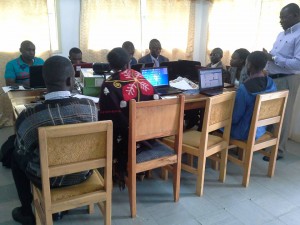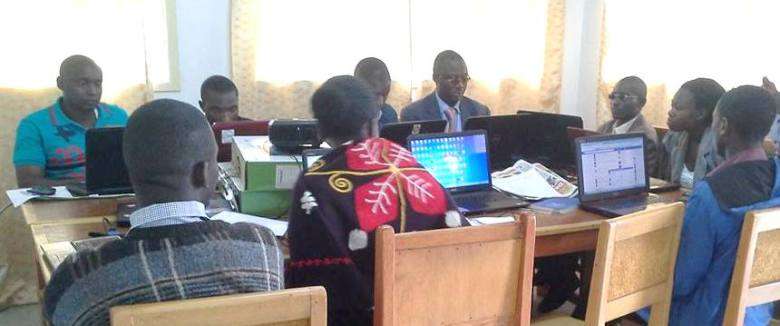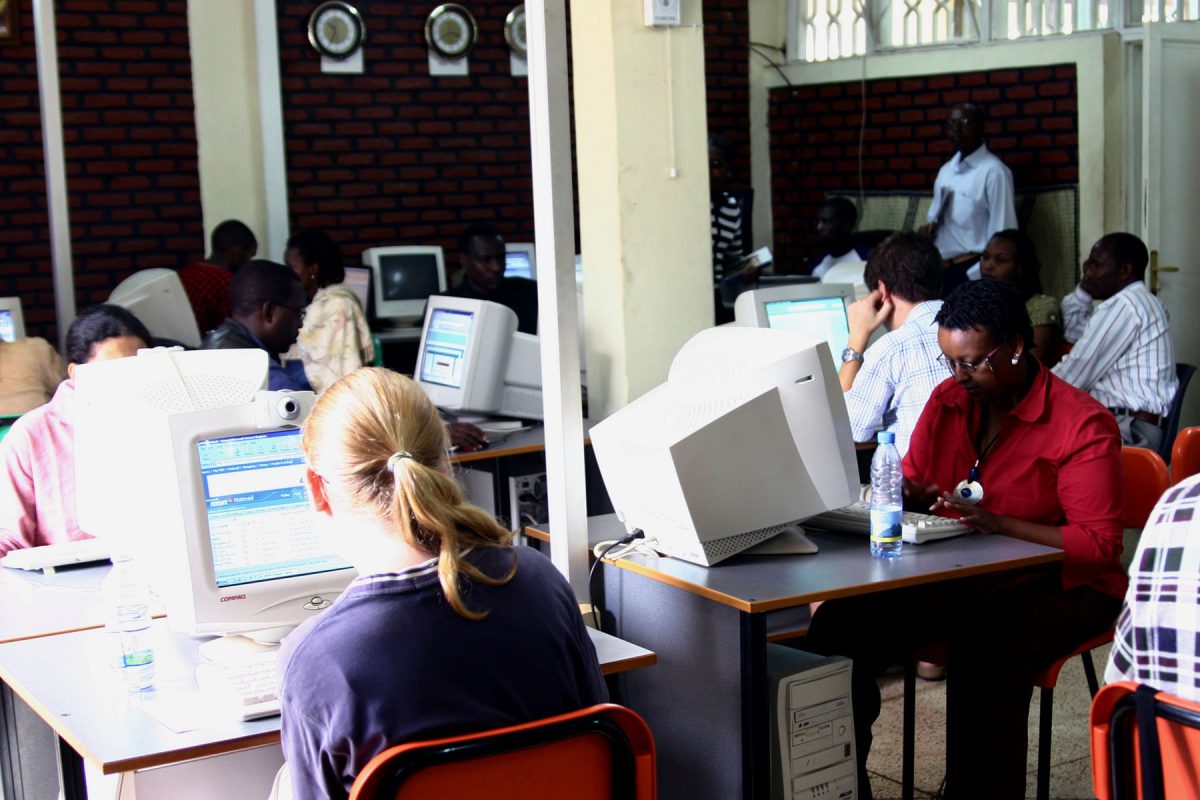By ToroDev Staff Writer |
Radio has proved to be a key tool in promoting public accountability and improved service delivery in the Rwenzori region of western Uganda. Toro Development Network (ToroDev), a non-governmental organisation that trains marginalised communities on service delivery monitoring and participation in governance processes, has reached wide audiences by supplementing their radio activities with additional Information and Communication Technologies (ICT) tools and traditional offline engagements.

ToroDev is working in partnership with two popular regional radios stations, Hits FM and Better FM, on public accountability radio talk shows focusing on topics such as corruption, politics, poor public infrastructure and health services delivery. ToroDev has enabled wider participation in the radio discussions through the installation of the online polling application Trac.FM at partner radio stations which is supported by pre-paid SMS enabling citizens to share their opinions. Journalist Forums, social media platforms and live call ins further facilitate the debates.
The convergence of these ICT tools has spurred audience participation from 304 monthly responses from citizens in early 2014 to 4,835 responses per month by November 2014, based on aggregated social media responses, radio station SMS and call in figures as well as Trac.FM statistics.
In December 2014, the Orukurato radio talk show on Hits FM discussed the issue of electricity load shedding in the region. According to the show’s host William Kasigazi, over 5,000 responses through call ins on, Trac.FM and social media were received on the topic, of which 85% of respondents were affected by lack of electricity for a few hours at least once every day.
This unusual influx of responses during the December 2014 load shedding debate led to the regional Director of Umeme (the national electricity supplier) to request for a slot on the show to educate citizens on the cause of the power cuts.
Meanwhile, in order to promote more rural debate and participation (where access and cost of ICT remains a limiting factor), ToroDev also conducts monthly physical accountability meetings as opportunities for communities to directly engage with local duty bearers. The number of citizens participating in these meetings rose from 60 individuals per meeting in December 2013 to an average of 200 per meeting by August 2014. An increase in women participation in these meetings was also registered, from five in 2013 to 50 in December 2014. Half of the participants at each meeting were youths.
Instrumental to the success of the project has also been the use of 15 advocacy forums which were initiated to encourage rural service delivery monitoring and monthly governance deliberations.
Andrew Twesige of the Bufunjo Peoples Forum noted that its lobbying work for improved service delivery at the Bufunjo Health Centre III was a success. Through online and offline community engagements and increased awareness on the state of service delivery at the health centre by the Forum, the issue of low staff levels at the Centre reached the attention of local duty bearers and six additional nurses were recruited for the health centre.
Such outcomes are helping more citizens in communities where ToroDev works to embrace the use of ICT tools in public services monitoring.
“Before the radio talk shows were introduced, leaders were very hard to reach and we used to fear them, beg them, they were taken as special people. But radio talk shows, TracFM and accountability meetings have helped citizens to work hand in hand with both political and technical leaders,” said Jane Ahimbisibwe who heads the Butiti Peoples Forum in Kyenjojo district. She added that through these tools citizens are shedding the fear previously held for duty bearers noting, “we are brave enough to approach any leader because we have been given a good platform.”
Indeed, the increasing popularity of the talk shows, the use of polls on on Trac.FM and the accountability meetings have attracted national and local duty bearers to more willingly engage with citizens on the platforms availed through ToroDev. During 2014, a total of 60 leaders at sub-county and parliamentary level participated in the monthly accountability meetings, and jointly with the advocacy forums drew up action plans for priority public service issues. A notable participant in such engagements was the State Minister for Finance (Uganda), Aston Kajara.
ToroDev’s work is part of the ICT4Democracy in East Africa Network, a regional coalition of civil society organisations coordinated by the Collaboration on International ICT Policy for East and Southern Africa (CIPESA). The network is supported by the Swedish International Development Cooperation Agency (Sida).
Here's What CIPESA is Up To in 2015
ICT4Democracy in East Africa Network: With funding from the Swedish International Development Cooperation Agency (Sida), CIPESA is coordinating this project, which includes sub-granting to the following partners: the Commission for Human Rights and Good Governance (Tanzania), iHub Research (Kenya), the Kenya Human Rights Commission, Women of Uganda Network, Toro Development Network, and Transparency International Uganda. The Network uses ICT to promote citizen participation in democratic processes, human rights monitoring and social accountability.
OpenNet Africa: This project continues from 2012 and has support from the Humanist Institute for Cooperation with Developing Countries (Hivos) and the Open Technology Fund. Activities include an examination of the threats to access, privacy and security online in Burundi, Ethiopia, Kenya, Rwanda, Tanzania, and Uganda. We are documenting internet rights violations on an ongoing basis and maintaining the www.opennetafrica.org portal as the one-stop resource on internet freedoms in Africa. We are training human rights defenders, journalists, bloggers, artists and minority groups on internet freedoms, privacy and security online; as well as testing and promoting the use of tools that enable anonymising users’ identities, secure communications and the circumvention of online censorship.
Leveraging Open Data and the Right to Information to Promote Service Delivery: The purpose of the project is to empower citizens in East Africa to use Right to Information (RTI) laws and constitutional guarantees in combination with ICT to lodge information requests from public bodies. The project also involves awareness-raising and network building activities to promote RTI in Kenya, Uganda and Tanzania. The work is supported by the Open Society Foundations.
iParticipate Uganda: This project has been ongoing since 2011 and is currently supported by Sida. Activities include training of media and civil society in the use of ICT to promote citizen participation in democratic processes; research and promoting awareness on the utility of ICT for promoting citizen participation in democratic and public accountability processes. The activities also include provision of support to grassroots public ICT access centres; and engaging policy makers and other influencers on enabling ICT related policies to support democratisation and free expression.
Local Actions to Secure Internet Rights: This project specifically focuses on promoting individual’ privacy and personal data online. Using the current drafting process of the Uganda Data Protection and Privacy Bill 2014, we are building advocacy work towards the adoption of a progressive legislation that protects individuals’ data and privacy in the digital era. The country has a number of laws that undermine the rights to freedom of expression, data protection, privacy and access to information. These include: the Anti-Pornography Act 2014, The Regulations on Interceptions on Communications 2010, Anti-Terrorism Act 2002, Official Secrets Act 1964, and the Computer Misuse Act 2011. The Ford Foundation is supporting this work through the Association for Progressive Communications (APC).
CIPESA 2014 Projects
ICT4Democracy– iParticipate Uganda. This project has support from Spider to October 2014 and from Sida to December 2014. Activities will include documenting and publicising the benefits of open governance to citizens and the media; training of media and civil society in the use of ICT tools to promote citizen participation; provision of support to grassroots public access centres; policy analysis on Kenya, Tanzania and Uganda; research on ICTs and governance; and research dissemination.
Coordination of the ICT4Democracy in East Africa Network. With funding from Sida (January 2014-December 2014), CIPESA will manage this project which involves the disbursement of funds for the activities of the following partners: the Commission for Human Rights and Good Governance (Tanzania), iHub Research (Kenya), the Kenya Human Rights Commission, Women of Uganda Network, Toro Development Network, Transparency International Uganda, and CIPESA.
Promoting internet freedoms: This project continues from 2013. It has support from Hivos (January and February 2014), and from the University of Toronto (January 2014-October 2014). Activities will include finalising research on internet freedoms policies and practices in Burundi, Ethiopia, Kenya, Rwanda, South Africa, Tanzania, and Uganda; documenting internet rights violations and maintenance of the www.opennetafrica.org portal as the one-stop resource on online freedoms in Africa.
Leveraging Open Data and the Right to Information to Promote Service Delivery: The purpose of the project is to empower citizens in East Africa to use the RTI law to lodge requests and document their experiences through the use of Information and Communication Technologies (ICTs). The project also aims to undertake awareness-raising and network building activities to promote the right to information in Kenya, Uganda and Tanzania. The work is supported by the Open Society Institute from January 2014 to December 2014.


